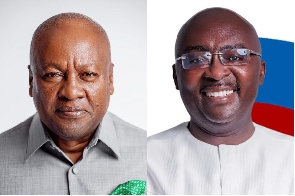Opinions of Tuesday, 12 December 2023
Columnist: Isaac Ofori
Examining the influence and limitations of online polls: The case of Global Info Analytics
In the contemporary digital landscape, online polls have increasingly gained prominence, with Global Info Analytics Polls emerging as a notable example. These polls have positioned John Dramani Mahama of the National Democratic Congress (NDC) as a frontrunner, surpassing Mahamudu Bawumia of the New Patriotic Party (NPP) and other contenders. Despite Global Info Analytics acknowledging the non-scientific nature of these polls, they have been extensively disseminated by major online news outlets, suggesting a significant impact on public perception.
However, the scientific rigour and methodological soundness of such online polls warrant critical examination. The inherent limitations of online polling methods, particularly their vulnerability to manipulation and lack of robust sampling techniques, cast doubt on their reliability and validity as tools for accurately predicting political outcomes. The ease with which political activists can disseminate these polls across social media platforms like WhatsApp, Facebook, or Instagram, encouraging partisan voting, further undermines their representativeness. Additionally, the absence of stringent measures to prevent duplicate voting or to establish clear inclusion and exclusion criteria further questions their credibility.
The role of Global Info Analytics in this context appears to be more than just conducting polls; it seems to be an orchestrated effort to shape public opinion in favour of a specific political agenda. The portrayal of the NDC's candidate in a favourable light, without substantial counter-narratives from other political entities such as the NPP, suggests a strategic attempt to influence the electorate's opinion and sway it towards a particular political direction.
In response to this, it is imperative for other political parties, like the NPP, to engage in proactive measures that counterbalance this narrative. This could involve conducting their own regionally diverse polls or presenting data-driven arguments that challenge the assertions made by Global Info Analytics. Such a strategy would not only provide a more balanced view of the political landscape but also promote a more informed and critical electorate, capable of discerning between scientifically robust polls and those with potential biases or methodological flaws.
In conclusion, while online polls like those conducted by Global Info Analytics play a role in shaping public opinion, their methodological limitations and potential for bias necessitate a cautious and critical approach from both the public and political entities. Ensuring a balanced and scientifically sound discourse is crucial for maintaining the integrity of the democratic process.













